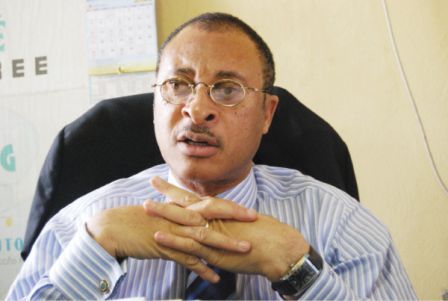Confirmation has come that President Muhammmadu Buhari will be going to America this month. This going to America should not only be different from that of the African prince portrayed by Eddie Murphy, it should be different from that which marked both the beginning of the Yar’Adua and Jonathan presidencies. This going to America for an ailing nation of great potential must be a concrete effort at forging partnerships in pursuit of the great goal of the Great Escape from misery for the biggest concentration of the people of Africa descent.
Going to America has always been a matter laced with Irony. As a young youth corps member reporting for the Newbreed newsmagazine some 38 years ago, I wrote a story that pointed to Army Intellectual, Olusegun Obasanjo, criticising African leaders journeying to America. As head of state then, Obasanjo had evidently forgotten his old quips, and was preparing for a journey to America.
I have never thought of going to America a problem. The mindset of “America their America” offered by one of our literary giants was not my own frame. What my concern always was and remains the issue for this visit, is, how to go beyond ceremonials and photo opps to handshakes that produce mutually beneficial outcomes. For the US and Nigeria this has to include in today’s context a boosting of capacity for security and economic advancement in Nigeria and trade opportunities with new markets for American products where there is comparative advantage that does not depress prospects for sustainable development in a country of prospects.
With security problems in Nigeria’s North-East threatening efforts to reduce the scourge of poverty, disease, and a brutish state of nature, a huge infrastructure deficit, financing gaps that have left even salaries unpaid for months, partnerships with foreign powers need be obsessively focused on relationships that can help bridge gaps and uplift the Nigerian condition.
In this regard, I am persuaded that with we, as Nigeria, should unveil a clear national strategy anchored on latent comparative advantage based on select factor endowments in which value chains in which we are quite competitive are developed into global markets. With the Chinese understanding of the benefits of industrial policy in building such values chains, we should not be shy to do infrastructure deals around industrial parks with them. In the same way, opportunities for partnerships with the South Koreans, Japanese and with the Australians in mining and road infrastructure should not be allowed to slip by. With the Americans, so much can be done with power, services, technology and education. We need to expand our fast growing education and health sectors. With so many Nigerians of the Diaspora active in the US in these areas, the trip should be used to build bridges. We just saw reports of a meeting of Nigerian physicians in the US which took place in Orlando Florida. We should tag into that to be a medical tourism hub.
What a visit such as this must do is provide the opportunity for President Buhari to find that one quiet moment to provide assurance of lasting goodwill if specific support with arms, equipment and intelligence to accelerate ending the insurgency, is offered. A clear shopping list is helpful and a pointer to an appropriate desk officer to serve as a clearing house should be determined. We should neither play the subservient with a begging nor our protocol laced meeting of equal sovereigns, friends don’t ask who is bigger. They know.
We miss much running around at the highest levels with much concerns when the ambassador can court the right desk officer and get things moving. If President Buhari can convey the warmth of friendship, passion, and selfless giving of self for the good of a country that has been unfairly treated, he could get a useful nod from President Barack Obama that his people can work with. He needs to have a few of those critical people with him. He must not leave the impression the ones before him left, that there is no capacity or interest in making promises bear fruit. Our failure to profit from the African Growth and Opportunities Act is a case in point.
In that sense, an opportunity to thank Obama for the Power Up Africa initiative with specific requests for how it can help reduce the darkness of our patch of earth at night and put many to work, so Boko Haram will find it harder to find recruits should be clearly stated. Here, it will be nice to nicely apologise for our tardiness with AGOA, and pledge that in the spirit of change and new beginnings in Nigeria, the economy of Nigeria will be more engaged with an AGOA extension.
President Buhari will profit much from elevating the tone by showing resolve to wholeheartedly fight corruption. America helps with tracking and repatriating money stolen from the Nigerian people. This should be requested.
If change is to result in dividends for the Nigerian people, President Buhari’s visit to Washington must not be a visit from the leftovers. It must be worked at so it becomes a journey into a welcoming mat for a strategic partner. When President Jimmy Carter’s 1977 world tour that would have brought him from Europe into Africa was terminated in Europe, due to urgent developments at home, a rescheduling was done. On resumption in 1978, the visit to Nigeria was dubbed, by one of America’s newsmagazines, as “Carter’s journey to the leftovers.” We owe it to our children that this visit to Washington not to be seen as another visit from the leftovers.
Utomi, political economist and professor of entrepreneurship, is founder of the Centre for Values in Leadership

